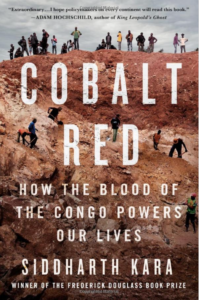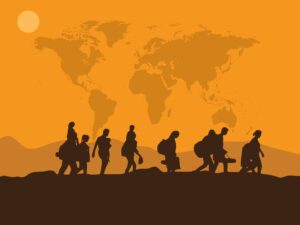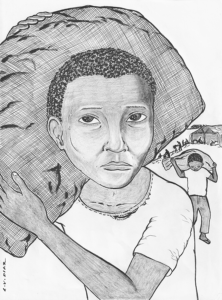At our Friday evening meeting just before Pentecost, we shared with the men of Casa Juan Diego the reading from the Acts of the Apostles about the coming of the Holy Spirit. When the Apostles, filled with the Holy Spirit, began to speak in different languages, those in the large crowd from many nations heard them speaking in their own languages. A renewal of God’s hope for his people in such contrast with the Tower of Babel. We prayed that the Holy Spirit may continue to come to Casa Juan Diego where we have many cultures and languages represented among our guests, but we manage to be able to understand one another.
For several months we have been somewhat overwhelmed by all the migrants and refugees who have been arriving at our doors. In the weeks before May 11, 2023, the date when thousands were expected at the border each day, more and more people were walking up to Casa Juan Diego asking for refuge. They continued after May 11 to make their way here, although not in the massive numbers that some predicted.
We were already at capacity. People are still arriving. We survive because those who help in our houses, Catholic Workers, ayudantes team, and volunteers, all work together to make life possible in a basic, practical way and to try to maintain a positive spirit among many guests with questions and needs. We can only offer a very temporary place to stay for the newest arrivals from many countries.
As we speak with our guests, we learn more about their suffering, why they came to try to enter the United States, and the trauma of their journey. As we reflect on the situations that uproot those who come to take refuge at Casa Juan Diego, we are struck again by Peter Maurin’s philosophy of work and his vision of a community, a world, where all might work with dignity and enjoy the basic fruits of their labor.
In the midst of our busyness we try to study a bit about the countries our guests come from. The first question in our minds is why so many Venezuelans have arrived in the last couple of years.
The next question is why so many people coming from Venezuela are very thin. We ask for men’s jeans, waist sizes 28-34 (or even smaller) because so many thin guests arrive. The United Nations reports that “most Venezuelans face difficulties in accessing food, that 10.9 million are undernourished or chronically hungry. Some 4.3 million are deprived of food, sometimes going days without eating.”
Venezuelans and Economic Sanctions
According to Human Rights Watch, 7.1 million Venezuelans have left their country since 2014. Some 5.9 million have migrated to Latin American and Caribbean countries. Persecution of political opponents, arrests, and torture, as well as abuses against indigenous communities related to mining have increased the pressure to migrate.
A recent report by Venezuelan economist Francisco Rodriguez entitled “The Human Consequences of Economic Sanctions,” argues that economic sanctions have a major adverse effect on living conditions in targeted countries. Sudies have also found that the imposition of sanctions by the U.S. leads to a decline in income per capita of up to 26%. Rodriguez states that “That’s the equivalent of causing a Great Depression.”
When sanctions are imposed on a country like Venezuela and like Cuba, they lead to a major economic contraction. In Venezuela, GDP per capita has fallen by 72%. And this has generated a massive exodus. Almost 25% of the population has left. For further information see: “U.S. Sanctions on Venezuela & Cuba Fuel Migration Even as U. S. Restricts Asylum Seekers at Border.”
https://www.democracynow.org/2023/5/12/migrants_venezuela_sanctions
“Human Rights Watch – World Report 2023 Venezuela Events of 2022.” https://www.hrw.org/world-report/2023/country-chapters/venezuela
The Blood of the Poor in the Democratic Republic of the Congo
 We have learned that where political colonialism from the past has changed into the economic colonialism of the present, the poorest, who suffer the most from often inhuman working conditions, cannot make the trip to the United States, especially if they have to cross an ocean.
We have learned that where political colonialism from the past has changed into the economic colonialism of the present, the poorest, who suffer the most from often inhuman working conditions, cannot make the trip to the United States, especially if they have to cross an ocean.
Some of our guests are from the Democratic Republic of the Congo, a country very rich in minerals, especially cobalt.
According to Siddharth Kara, author of a new book, Cobalt Red: How the Blood of the Congo Powers Our Lives (St. Martin’s Press, 2023), “The Katanga region in the southeastern corner of the Congo holds more reserves of cobalt than the rest of the planet combined.” Kara has spent the last 20 years researching on a practical level with the people.
Cobalt is essential in the manufacture of lithium-ion batteries for most of technology used today, including smart phones, tablets, rechargeable batteries for electric cars, and other sources of renewable energy. So much that we depend on! Kara.states, “Our daily lives are powered by a human and environmental catastrophe in the Congo.”
In interview on “Goats and Soda” of NPR, Kara described the conditions under which the people of the Congo extract the cobalt for our devices: “Imagine an entire population people who cannot survive without scrounging in hazardous conditions for a dollar or two a day. There is no alternative there. The mines have taken over everything. Hundreds of thousands of people have been displaced because their villages were just bulldozed over to make place for large mining concessions. So you have people with no alternative, no other source of income, no livelihood. Now, add to that the menace in many cases of armed forces pressuring people to dig with their pickaxes, parents having to make a painful decision, ‘Do I send my child to school or do we eat today?’ And if they choose the latter, that means bring all their kids into these toxic pits to dig just to earn that extra fifty cents or a dollar a day, that could mean the difference of eating or not.” Kara added, “Cobalt is toxic to touch and to breathe. – and there are hundreds of thousands of poor Congolese people touching and breathing it day in and day out. Young mothers with babies strapped to their backs, all breathing in this toxic cobalt dust.”
The tech companies (such as Apple, Samsung, Tesla, Daimler, Glencore, all of which must buy from the companies that control the mining in the Congo) that use cobalt in all of their batteries and devices put out statements that they supervise the supply chain so that horrible working conditions, which include devastating accidents which kill and maim workers, will not exist. In Kara’s extensive research on the ground in the DRC, he found no evidence linked to any coalitions for safe working conditions in the Congo or for human rights standards. The evidence did not exist. They were paper promises. He said in his book:
“There are many episodes in the history of the Congo that are bloodier than what is happening in the mining sector today, but none of these episodes ever involved so much suffering for so much profit linked so indispensably to the lives of billions of people around the world.”
We at the Houston Catholic Worker join Siddharth Kara in pleading for our readers and many others to join an effort to ask that the tech companies and mining companies who make trillions of dollars from the hazardous work of the poor change their actual practices. They must treat those who dig the cobalt as human beings, at least as well as they treat those in their corporate offices – so that we will not be ashamed to use the wonderful technical devices their companies make– and not with paper promises.
We hear a lot about fair trade coffee. When we discussed chapters from Kara’s book at our weekly clarification of thought luncheon, CW Patrick McKenzie lamented, “If only there were fair-trade cobalt.”
In the meantime, we welcome those from the Congo who are able to make it to the United States. And we join with Pope Francis as he cries out in his new book: Hands Off Africa!, written following his visit to the DRC and South Sudan. At present the Pope’s book is published only in Italian. In his book, the Holy Father cries out: “Hands off Africa! Stop choking Africa: It is not a mine to be exploited, or a land to be plundered. May Africa be a protagonist of its own destiny!”
Guatemalan Refugees – The Q’eqchi Community and the Nickel Mine
 When a child is in Immigration custody and is about to have their 18th birthday, frequently Immigration looks for a place in the community that will receive that child instead of sending them to adult detention. An 18-year-old girl from Guatemala who was turning eighteen was just released to us by Immigration. She is a part of the Q’eqchi indigenous group. She knew no one in the United States; she had traveled here on her own as an unaccompanied minor; she spoke only a little Spanish. We were grateful that a family of the Q’eqchi community in Houston volunteered to receive her until she was able to locate a family member in the U.S.. We recently received three young men from the same Q’eqchi culture when they turned 18.
When a child is in Immigration custody and is about to have their 18th birthday, frequently Immigration looks for a place in the community that will receive that child instead of sending them to adult detention. An 18-year-old girl from Guatemala who was turning eighteen was just released to us by Immigration. She is a part of the Q’eqchi indigenous group. She knew no one in the United States; she had traveled here on her own as an unaccompanied minor; she spoke only a little Spanish. We were grateful that a family of the Q’eqchi community in Houston volunteered to receive her until she was able to locate a family member in the U.S.. We recently received three young men from the same Q’eqchi culture when they turned 18.
We have known for a long time about the suffering of the indigenous peoples of Guatemala. During the 1980’s Casa Juan Diego received many refugees from that country, where a terrible genocide was occurring against the indigenous population. New investigations and reports reveal that oppression of the indigenous communities continues. One of the communities that is suffering is the Q’eqchi.
The Hidden Story of a Notorious Nickel Mine
The Pulitzer Center reports that “Around a million speakers of Q’eqchi’ Mayan live in regions with some of the highest rates of poverty, childhood malnutrition, and land inequality in the hemisphere. These indicators are getting worse. Climate change is extending droughts and intensifying storms. Massive export crop plantations are expanding, grabbing land and water. Transnational mining and hydroelectric companies are operating without the consent of local communities required by international law.”
A group of journalists from “The Intercept” and 19 other media organizations in Europe and Latin America joined forces to investigate the Fenix nickel mine, Solway, and its two Guatemalan subsidiaries, Pronico and CGN. The Fenix mine was owned by Canadians for decades until it was purchased by Solway, widely acknowledged as a Russian company. The “Mining Secrets” journalistic partners reported that it is now based out of Zug, a known tax haven in Switzerland.
Like cobalt, nickel is essential for the handy devices so many of us depend upon. According to publications from the Hallmark Mining Corporation, “Nickel is a vital part of several rechargeable battery systems used in electronics, power tools, transport and emergency power supply… Iron and nickel alloys are the most widely used in electronics and specialist engineering. . . Nickel properties also make the metal vital in electrical connections of mobile phones, capacitors and batteries.”
Tourist advertisements tell the world about the wonders of Lake Izabal, the largest lake in Guatemala. These advertisements about Lake Izabal neglect to mention how it is being ruined by the pollution from the nickel mine in the area. The Q’eqchi fishermen who depended on the lake for their livelihood have been unable to fish because of the sediment from the mine that turned the lake red. The local communities protested; however, through corruption and bribery, hidden “environmental” reports, and forcible and murderous removal of protestors, the company continued its mining with cooperation from the Guatemalan government and renewed licenses.
In the meantime, the Q’eqchi community is even poorer, frightened by intimidation, and the young people are trying to come to the United States so that they can survive.
Newsweek magazine has reported that in striving to compete with China in the acquisition of metals precious to the technology industries and electric cars, “The U.S. government is supporting a Canadian company to acquire a controversial nickel mine in Guatemala” – that very same mine. This acquisition may be made possible by the sanctions imposed on Russia. According to Newsweek, “The mine is owned by a Switzerland-based investment group, whose Guatemalan assets were put under U.S. sanctions amid allegations of Russian ‘influence peddling.’ Guatemala may have become the latest battleground in America’s bid to gain a foothold in the race for strategic metals dominated by China amid a remarkable proposed acquisition of a notorious nickel mine worth $1 billion.”
https://theintercept.com/2022/03/27/solway-guatemala-nickel-mine/;
https://www.newsweek.com/newsweek-exclusive-us-bid-help-secure-sanctioned-1bn-nickel-mine-guatemala-fenix-1792282
Bringing Good News to the Poor
As Christians, we can try to remember the words of the Nazarene who quoted from the Book of Isaiah: “The Spirit of the Lord is upon me because the Lord has anointed me to preach good news to the poor; He has sent me to heal the broken-hearted, to proclaim liberty to the captives, and the opening of the prison to those who are bound.” May each of us follow in His footsteps in personally welcoming the poor, the stranger, the broken-hearted, but also in helping to bring good news so that people will not have to leave their homes.
Houston Catholic Worker, Vol. XLIII, No. 3, July-September 2023.


